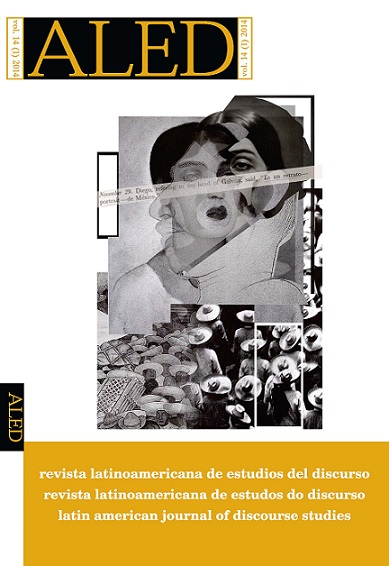El investigador y el compromiso
Una cuestión de contrato comunicacional
Keywords:
contract of communication. critical discourse. discursive roles. interpretation. scholar’s stance.Abstract
In a world of increased circulation of knowledge due to the development of communication networks, where speech tends to impose itself without questioning the legitimacy or the credibility of its author, the problem of the place given to the voice of the Humanities and the Social Sciences scholar in this more or less organized concert of voices becomes all the more important. We must ask: What is critical discourse analysis? Is it an integral part of the Social Sciences and the Humanities or is it characteristic of a specific discipline? What does it mean “to interpret” in the Humanities and the Social Sciences? Should this activity remain within a given discipline or should it be subject to interdisciplinary comparisons? What discursive roles can the scholar hold in a situation where he is required to transfer his knowledge to lay men and how can he avoid confusing them? Finally, what are the possible stances a scholar can take with regard to these diverse activities? This paper aims at answering such questions, from the personal perspective of a scholar who wishes to convey his own experience.
Downloads
References
Aristote (1987). Organon IV. Paris: J. Vrion.
Boltanski, L. (2009). De la critique. Précis de sociologie de l’émancipation. Paris: Gallimard.
Bourdieu, P. (2001). Langage et pouvoir symbolique. Paris: Seuil.
Cassin, B. (Dir.) (2004). Vocabulaire européen des philosophes. Paris: Seuil.
Charaudeau, P. (Ed.) (2001). La télévision et la guerre. Déformation ou construction
de la réalité. Le conflit en Bosnie (1990-1994). Bruxelles: Ina-De Boeck.
Charaudeau, P. (2010). Pour une interdisciplinarité «focalisée» dans les sciences humaines et sociales. Questions de Communications 17:195-222.
Charaudeau, P. (2011). Que vaut la parole d’un chroniqueur à la télévision?
L’affaire Zemmour, comme symptôme d’une dérive de la parole médiatique. Réseaux 170: 135-161.
Charaudeau, P. (2012). Pour une interdisciplinarité focalisée. Réponses aux réactions. Questions de Communication 21: 171-206.
Charaudeau, P. (2013). La conquête du poivoir. Opinion, persuasion, valeurs, les discours d’ une nouvelle donne politique. Paris: L’Harmattan.
Chevalier Y. (1999). L’ “expert” Ã la televisión. Paris: CNRS-Éditions.
Durkheim, E. (1988). Les régles de la méthode sociologique. Paris: Flammarion.
Fleury, B. y Walter, J. (Dir.) (2008). Les médias et le conflit israélo-palestinien. Feux et contre-feux de la critique. Metz: Université Paul Verlaine.
Lemieux, C. (2000). Mauvaise presse. Paris: Métailié.
Platon (1966). La république. Paris: GF-Flammarion.
Remaux, O. y Schaub, J. F. (Ed.) (2012). Faire des sciences sociales 2. Comparer. Paris: École des Hautes Études en Sciences Sociales.
Ricœur, P. (1990). Entre herméneutique et sémiotique. Nouveaux Actes Sémiotiques 7: 1-45.
Spinoza, B. (2008). Traité de la réforme de l’entendement. Paris: Flammarion.
Weber, M. (2003). Le savant et le politique Paris: La Découverte.
Downloads
Published
How to Cite
Issue
Section
License

This work is licensed under a Creative Commons Attribution-NonCommercial-NoDerivatives 4.0 International License.
The authors retain the copyright and guarantee RALED the right to be the first publication of the work as well as a Creative Commons Attribution License that allows others to share the work with recognition of authorship and the initial publication in this journal.




